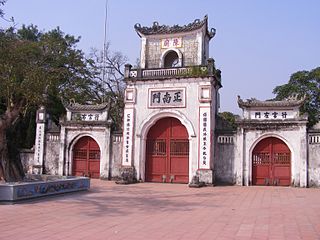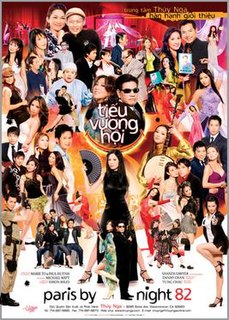Trần Quốc Vượng may also refer to:
Trần Quốc Vượng may also refer to:

Trần Hưng Đạo, real name Trần Quốc Tuấn (陳國峻), also known as Grand Prince Hưng Đạo, was a Vietnamese royal prince, statesman and military commander of Đại Việt military forces during the Trần Dynasty. Hưng Đạo commanded the Vietnamese armies that repelled two out of three major Mongol invasions in late 13th century, won the feat of "reputating the North, causing the enemy in the North to call him An Nam Hưng Đạo Vương but dare not call his real name". His multiple victories over the Yuan Dynasty under Kublai Khan are considered among the greatest military feats in Vietnamese history.

The Trần Temple of Nam Định is a temple complex of which the more recent middle section is dedicated to national hero Hưng Đạo Đại Vương in Nam Định, Vietnam.

Vietnam National University, Hanoi is a public research university in Vietnam. The university has 10 member colleges and faculties. VNU is Vietnam's national university, and it is the most prestigious university in Vietnam, ranked 201-250th in Asia by the QS ASIA University Rankings 2020. In 2020, it was one of the first two Vietnamese universities to be included in the QS Global Ranking of Top 150 universities under 50 years old by 2021.

Paris By Night 82: Tiếu Vương Hội is a Paris By Night program that was filmed at Studio 40 of the Canadian Broadcasting Centre in Toronto, Canada on Saturday, March 25, 2006. It is one of Thúy Nga's "private" shows, as in, limited seats are available, and some are only invited guests only.

Trần Thái Tông, personal name Trần Cảnh or Trần Nhật Cảnh, temple name Thái Tông, was the first monarch of the Trần Dynasty, reigned Đại Việt for 33 years (1226–58), being Retired Emperor for 19 years. He reigned during the first Mongol invasion of Vietnam before eventually abdicating in favor of his son Trần Hoảng in 1258.

Trần Minh Tông, real name Trần Mạnh (陳奣), was the fifth emperor of the Trần dynasty who ruled Đại Việt from 1314 to 1329. After ceding the throne to his son Trần Hiến Tông, Minh Tông held the title of Retired Emperor for 29 years. As the last emperor in the prosperous period of Trần dynasty, Minh Tông was known for his successful reign of Đại Việt with the assistance of many talented mandarins. Minh Tông was also the longest-reigning retired emperor in history of Vietnam when he acted as a regent and co-ruled with Hiến Tông and Dụ Tông. His death marked a significant turning point in the history of the Trần Dynasty, as the country began to decline and soon fell into troubled times.
Trần Hiến Tông, given name Trần Vượng, was the sixth emperor of the Trần dynasty who reigned Đại Việt from 1329 to 1341. Enthroned by Minh Tông when he was only a ten-year-old boy, Hiến Tông ruled Đại Việt with the regent of the Retired Emperor Minh Tông during his thirteen years of reign. The Emperor died at the age of 23 and leaving no heir, he was succeeded by his younger brother Trần Hạo. The death of Hiến Tông and his father afterward marked the turning-point in history of Trần dynasty when the country began to fall into the trouble times.
The Four Immortals refers to the four chief cult figures in the pantheon of genii worshiped by the Vietnamese people of the Red River Delta region. They are Tản Viên Sơn Thánh, also known as Sơn Tinh (山精) the god of Tản Viên Mountain, Phù Đổng Thiên Vương a giant who defeated northern invaders, Chử Đồng Tử (褚童子) a sage, and Princess Liễu Hạnh (柳杏公主), a heavenly spirit and Mother Goddess.
Prince Chiêu Minh Trần Quang Khải (1241–1294) was the third son of Trần Thái Tông, first emperor of the Trần Dynasty of Vietnam. Being the younger brother of the Emperor Trần Thánh Tông and holding the position of grand chancellor of the Trần Dynasty for many years, Trần Quang Khải was one of the most important figures of the Trần family and the royal court during the reigns of emperors Thánh Tông and Nhân Tông. In the second war of resistance against the Mongol invasion, Trần Quang Khải and Trần Hưng Đạo were two key commanders of the Đại Việt army who helped the Emperor defeat the troops of Kublai Khan's son prince Toghan. Besides his military and administrative activities, Prince Chiêu Minh was also a famous poet and was credited as the creator of the dance of flowers. Today, Trần Quang Khải is still considered one of the most famous historical figures of the Trần Dynasty and is worshiped in several temples in Vietnam.
Marquis Hoài Văn Trần Quốc Toản was a marquis of the Trần Dynasty who was well known for his active role in the second war of resistance of Đại Việt against the Mongol invasion. Although there were only a few historical records about Trần Quốc Toản, he is still widely known as an example of patriotism in Vietnam while he participated and ultimately sacrificed himself for the country at a very young age. Today, story about Trần Quốc Toản is taught in Vietnamese schoolbooks and many places in Vietnam are named in honour of this young hero.
Trần Ích Tắc, or Prince Chiêu Quốc, was a prince of Đại Việt, the fifth son of emperor Trần Thái Tông of the Trần Dynasty, and the younger brother of the Emperor Trần Thánh Tông and grand chancellor Trần Quang Khải.
Prince Tĩnh Quốc Trần Quốc Khang (1237–1300) was the first prince of the Emperor Trần Thái Tông, the eldest brother of Trần Thánh Tông and princes Trần Quang Khải, Trần Ích Tắc and Trần Nhật Duật. Although a son of Thái Tông in name, Trần Quốc Khang's father was actually Prince Hoài Trần Liễu, who was forced by grand chancellor Trần Thủ Độ to give up his wife, Princess Thuận Thiên, to his younger brother Thái Tông when she was already pregnant with Trần Quốc Khang. For this reason, Trần Quốc Khang was not chosen as successor of Thái Tông for the throne and he did not have a significant role in royal court either, as his younger brothers did. Afterwards he was appointed as governor of Nghệ An, a position that his descendants inherited. Since Trần Quốc Khang was in fact a son of Trần Liễu, he was also a natural brother of general Trần Hưng Đạo, commander-in-chief of Đại Việt army.
Prince Yên Sinh Trần Liễu (1211–1251) was the elder brother of the Trần Thái Tông, the first emperor of Trần Dynasty. Initially, Trần Liễu was honoured by his younger brother with the title King Hiển but he was downgraded to Prince Yên Sinh after the short-lived revolt in fury of losing his pregnant wife, Princess Thuận Thiên, to the Emperor under the pressure of Imperial Regent Trần Thủ Độ. Besides this event, Trần Liễu was well known in the history of Vietnam for being father of Trần Hưng Đạo, commander-in-chief of the Đại Việt army during the second and third war of resistance against the Mongol invasion.
Hanoi Capital High Command of the People's Army of Vietnam, is directly under the reponsbility of the Ministry of Defense of Vietnam, tasked to organise, build, manage and command armed forces defending the capital of Vietnam.
Trần Quốc Vượng was a Vietnamese historian, archaeologist and culturologist. He was part of the generation including Hà Văn Tấn, and Phan Huy Lê which formed the foundation of Vietnamese History Studies since the 1950s. Since 1956, he was Professor of University of Social Sciences and Humanities - Vietnam National University, Hanoi and gave lectures on Vietnamese Ancient-Middle History, Archaeology and Culturology until 2005.
The Cấn line was the third dynasty of Hùng kings of the Hồng Bàng period of Văn Lang. Starting approximately 2524 B.C., the line refers to the rule of Lân Lang and his successors, when the seat of government was moved to what is today Phú Thọ.

The Central Inspection Commission of the Central Committee of the Communist Party of Vietnam was established in 1948 by a decision of the Central Committee, and is responsible for combating corruption, disciplining members and wrongdoing in general. It is the only organ within the party that can sentence or condemn party members. It is responsible to the Politburo and the Secretariat in between sessions of the Central Committee. The commission chairman is by right a member of the Politburo.

The 15th National Assembly of Vietnam is a parliamentary cycle that commenced in July 2021 following the legislative elections on 23 May 2021. The National Assembly has 499 members, formally confirmed at the 8th meeting of the National Election Council on 12 July 2021.

Trần Quốc Vượng is a Vietnamese politician. He was a member of the Politburo of the Communist Party of Vietnam, Standing member of the CPV Central Committee’s Secretariat, Former Deputy Head of Central Steering Committee on Anti-corruption, Member of the National Assembly of Vietnam. He has worked in many units and agencies of the Communist Party of Vietnam and Socialist Republic of Vietnam, serving as Chairman of the Central Inspection Commission of the Communist Party of Vietnam; Head of Central Office of the Communist Party of Vietnam, Secretary of the Party Personnel Committee, Prosecutor General of the Supreme People's Procuracy of Vietnam.